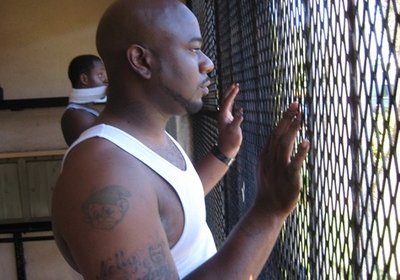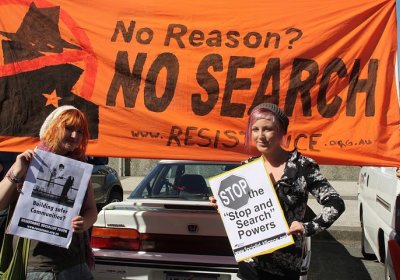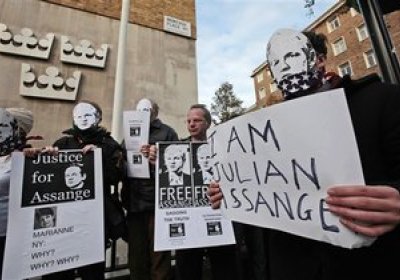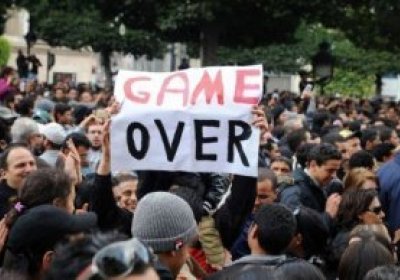You may have read about the prison riot in England on New Year’s Day, with prisoners staging an uprising over searches for contraband booze. What received less coverage was the much bigger and more important protest by prisoners in the United States in December.
Prisoners in a number of Georgian prisons began a strike on December 9, the December 20 Huffington Post said. The strike was called off after six days, “following reports of violent crackdowns and rising fears that the situation would escalate”, the article said.
Democracy
Georgia prisoner strike demands
Over December 9-15, prisoners in a number of prisons in the US state of Georgia organised a strike via contraband mobile phones. The prisoners refused to perform prison labour in protest at a range of unjust conditions they face. BlackAgendaReport.com said on December 15 that one in 12 Georgians were in prison.
The December 20 Huffington Post published the prisoners' demands, which are listed below.
* * *
Hundreds of protesters rallied in support of the whistleblowing website Wikileaks and its editor in chief, Julian Assange, in Sydney on January 15. Other rallies also took place in major cities around the world.
The rally, which began at Sydney’s Town Hall, was addressed by several key speakers. The protesters later took to the streets for a loud and lively march, which went past the US consulate and ended at Hyde Park.
The Socialist Alliance (SA) has criticised recent state government changes to the Liquor Control Act as an infringement of civil liberties.
Under the changes, police have the power to issue “barring orders”, which ban an individual from licensed premises without incurring a criminal conviction.
“Giving police the power to issue barring orders to patrons of licensed premises is tantamount to dishing out punishment before a person has been found guilty,” said SA spokesperson Alex Bainbridge.
Welcome to another year of Green Left Weekly, a proudly independent voice committed to democratic, investigative journalism.
2010 ended on a high note as Wikileaks and Julian Assange showed what true journalism is: exposing the abuses of power that hide behind the veil of government secrecy.
Assange was demonised by much of the mainstream media as a “criminal” and a “terrorist”, but the US and other governments could not defend their real crimes, which were exposed by the Wikileaks cables.
Wikileaks founder Julian Assange said that over the next six months, Wikileaks will be releasing more files related to Israel. “There are 3,700 files related to Israel and the source of 2,700 files is Israel,” he told Al-Jazeera on December 22. “The Guardian, El Pais and Le Monde have published only two percent of the files related to Israel due to the sensitive relations between Germany, France and Israel.”
A fresh federal government inquiry was announced on January 14 into the alleged torture of former Guantanamo Bay detainee Mamdouh Habib.
This follows the release of independent evidence supporting Habib’s claims and the recent undisclosed compensation settlement the Australian government made with him in December.
Prime Minister Julia Gillard had asked the inspector-general of intelligence and security Vivienne Thom to conduct the inquiry after new evidence was presented supporting Habib’s allegations that Australian officials were involved in his torture in Egypt in 2001.
Acting Nepali Prime Minister Madhav Kumar Nepal has argued that bullets, explosives and other munitions no longer constitute “lethal military hardware” as long as they are to be used for “training and other related works”.
MK Nepal was seeking to justify the decision to allow India to resume arms supplies to Nepal. He has never been elected and came to power after the Maoist-led government was brought down by a soft military coup in 2009.
Lawyers for Wikileaks founder Julian Assange have accused Swedish authorities of secretly planning to extradite him to the US as soon as it has built a criminal case against him.
Lawyer Mark Stephens told the media on January 12: “We are hearing that the Swedish are prepared to drop the rape charges against Julian as soon as the Americans demand his extradition.”
Resistance members joined a protest march through Sydney on January 15 in support of whistle-blowing website Wikileaks.
Rally goers chanted "Down with hypocrisy, we want democracy" and "Wikileaks is here to stay, we'll defend it all the way" as they marched from Town Hall to Hyde Park.
Resistance member and Socialist Alliance NSW Legislative Council candidate Patrick Harrison said: "Wikileaks must be defended, governments can't be allowed to get away with lies — the people of the world need the truth."
A number of Wikileaks revelations have shown that US officials, despite their public stance, have been well aware of corruption and human rights abuses of regimes it has supported. In some cases, the US funded these regimes and trained their military.
* * *
Indonesia
A leaked September 2009 US cable indicates that US officials are aware that in West Papua, the Indonesian military (TNI) are responsible for serious human rights abuses and corruption.
After 23 years of dictatorial rule, Tunisian President Zine El Abidine Ben Ali was forced to resign and flee to Saudi Arabia on January 14 due to a mass uprising.
- Previous page
- Page 499
- Next page









